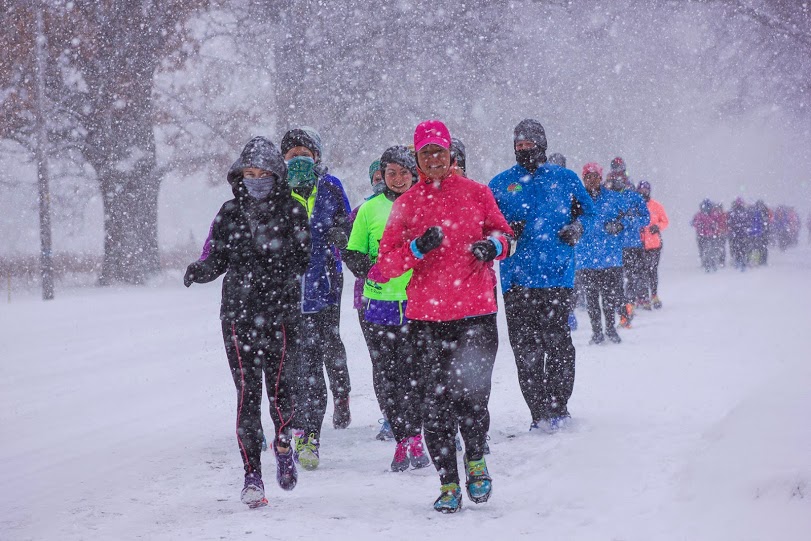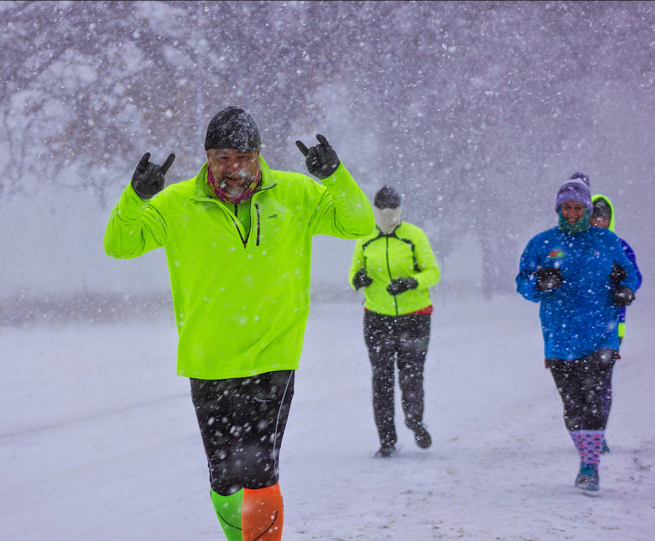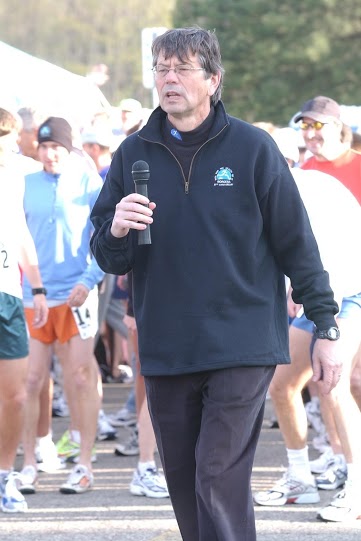Kalamazoo - the city that runs
“Where else can you go in your life on a Saturday morning where there's going to be more than a thousand people that are going to be totally interested in your life and want the best for you?” ‒ Lyle Gurd
Except for the weather – which was nasty even by this winter's standards – this particular morning was not all that different from other recent Saturdays in and around the streets of Kalamazoo.
On Feb. 14, about a thousand runners and walkers slogged through frigid temperatures, 25-mph winds and, at times, blinding snow, determined to make this training day at Borgess Run Camp count.
Among them was Jennifer Slayton, a 40-year-old Kalamazoo mother of two needled by a friend into joining the camp. Many pounds overweight, Slayton might have shocked herself by pushing to the finish. “I didn't know what to expect when I got into this,” she said.
“I thought, 'This is a run camp. I don't run.' But everybody was so encouraging, you kind of forget you're not a runner.
“I know I need to get healthier.”
Borgess Run Camp is now in its 14th year of preparing the out-of-shape, the discouraged and the overweight to do more than they imagined possible. Slayton's goal, one way or another, is to complete a 5K (3.1 miles) race during the Borgess Run for the Health of It races, set for May 1 through May 3.
An estimated 1,200 participants showed up for opening day of the 13-week camp at the end of January, intending to complete a 5K, 10K or half-marathon. Marathon runners began training in December.
Given Michigan's sub-par health report card, state health officials applaud community initiatives like Run Camp for bringing new participants into the fitness game.
A bulging mitten
According to the United Health Foundation, a nonprofit organization dedicated to improving world health care, Michigan ranked 34th of 50 states, with 50 being the worst, in its overall health index in 2014. Its obesity rate of 31.5 percent ranked 40th and the state’s rate of diabetes, linked to obesity, ranked 31st.
In 2011, state health officials warned that obesity-related medical costs could rise in Michigan from $3.1 billion in 2008 to $12.5 billion by 2018 if residents didn’t lose weight. Gov. Rick Snyder promoted a plan to improve public health and reduce the state’s health-care costs.
“I think (Run Camp) provides the social support that people really need,” Dawn Rodman, who coordinates health and wellness programs for the Michigan Department of Community Health, said of the Kalamazoo program. Rodman said she believes social connections can be key to engaging ‒ and keeping ‒ participants who might not otherwise stick it out.
She singled out a similar program in Okemos east of Lansing, where a sporting goods store, Playmakers, conducts training sessions for runners of all abilities, including a women’s “Couch to 5K” program designed to transform sedentary women into runners.
“It's hard for anyone to exercise on their own, especially if they haven't done it before.”
Exercising as grief therapy
Kalamazoo County resident Lyle Gurd, 56, is back for his second year, training for a half-marathon, a distance of 13.1 miles. But Gurd is quick to tell you this camp is about more than piling up training miles.
“I totally believe in it. I don't think there's any doubt how many lives it has changed.”
Gurd checked into Run Camp last year at about 310 pounds, having just begun a walking regime a few months before. He said he had been depressed, stuck on unhealthy eating habits, following a series of events over an eight-year-period that included divorce, the death of a child, the death of two sisters and his father, and a house fire that claimed all his possessions.
He initially trained for a 5K, then decided that wasn't a sufficient challenge. He bumped up his training to a 10K. In the end, he completed a half-marathon. He's aiming for the same distance this year.
Gurd now weighs about 220 pounds, proclaiming he never felt better.
“There is no comparison – it's everything from walking up stairs to just getting through your day's work.”
But Gurd insists the rewards of Run Camp transcend even that.
“My story is not unique. Where else can you go in your life on a Saturday morning where there's going to be more than a thousand people that are going to be totally interested in your life and want the best for you?”
Making friends, losing pounds
Blaine Lam, 68, director of Run Camp and owner of a Kalamazoo public relations firm, hears testimonials like that a lot. [Lam is also a member of the Center for Michigan’s Board of Advisors]
“We've turned the whole notion of running with people on its head. It used to be you run with people and then get to know them. We get people to know each other and then run.”
To be sure, the camp encompasses plenty of die-hard participants who have proven their fitness over years of dedicated training. They join in because they love running, and have for years.
But what distinguishes it from other training programs is its embrace of novice runners, including those who never laced up a pair of running shoes before. To that end, Lam has cultivated a volunteer network that has mushroomed to 11 coaches and about 125 team leaders.
Matched by the pace they can run, participants are assigned to a small group, each with a designated team leader. Within weeks, they are calling each other by first name and cheering each other on. Camp costs $75 for those who sign up in advance, $90 the day it begins.
A bigger tent
Lam launched the Borgess Run Camp in 2002 with help from an owner of Gazelle Sports, a Kalamazoo sporting goods store, and Borgess Health and Fitness Center Director Janeen Dosca, after realizing the typical runner's group left a whole lot of people out. Before forming the run camp, Lam recalled once showing up for a group run one morning at a local sporting goods store as a bunch of runners stood around, looking at each other, waiting for someone to give the signal.
“A guy came out of the store and said, 'Let's go.' I told my wife when I got back that I didn't know anyone any better at the end than I did at the beginning.”
Lam estimates he's been running for all but about 10 of his 68 years, including time at the University of Colorado as a member of the track and cross country team. He's completed five marathons and a couple dozen 10K races.
But over time, he grew to care less about mile split times or personal records and more about the idea of community: He wanted to bring more people to the party.
“Even people with weight issues don't necessarily have to lose weight,” Lam said. “It's about moving. They may not become marathoners, but we hope they are going to use this as a pathway to a healthier life.”
While it is a for-profit operation, Lam said the camp incurs expenses such as a part-time salary for the camp manager, pay for aid station workers and food for training runs. Proceeds from camp go to the Borgess Run in May, and Lam said proceeds from that event support four children’s charities. Lam is compensated for his time as camp director and race director.
Among the coaches are fitness experts like Tom Goodwin, a physician and board certified sports medicine specialist, and Rob Lillie, store manager at Gazelle Sports in Kalamazoo, an experienced sports trainer. Team leaders range in age from their 20s to their 60s and include professors, teachers, nurses, executives, homemakers and retirees. Many leaders began as first-time runners.
Sports trainer Lillie has been to several national conventions for specialty run retail sports stores, where runners, trainers and retailers swap knowledge about how to organize races and build participation. He's heard of nothing quite like Run Camp.
“There isn't anything like this in the nation, in terms of the size and breadth of caliber of runners or in the resources to support for someone doing the 5K up to the marathon,” he said.
Crowdsourcing
And it may be that Run Camp has yet to reach its peak. Just over 100 turned out the first year. By year five, it was 322. It topped 1,000 in 2014.
Team leader Tracey Lawie has contributed to this growth, as a first-year runner five years ago and leader the past four.
Lawie leads a group of 12 women training for the 5K at a 12-minute-a-mile pace or slower – not much faster than walking. They range in age from 28 to 61. About a third are overweight. Seven had never run before. Like other team leaders, she is also responsible for organizing a second run during the week for her group.
“I always try to make sure that we use a buddy system, so no one ever runs alone,” said Lawie, 45, director of marketing for Western Michigan University's Miller Auditorium, a performing arts venue.
Because of the range of abilities even within this group, Lawie said, one cluster of runners might finish a block or two ahead of another. But she sees to it everyone gets a proper reception when they reach the finish.
“If it wasn't fun, do you think 1,200 of us would get up at the crack of dawn in sub-zero temperatures to to do this?”
Among those in her group is Jennifer Slayton, the teacher, who recalled that day in February as she completed her training session with five teammates. It was snowing so hard in the home stretch she could barely see. But there at the end, three of her teammates stood and cheered as they trudged in. She felt like a champion.
“Everyone was out there in the cold and they were high-fiving and clapping. It makes you want to come out the next time. It makes you do more than you think you can.”
There were some that day who questioned why organizers didn't cancel camp, given weather bulletins warning people to stay indoors in the dangerous conditions. Run Campers pushed back.
Portage resident Debbie Argetsinger, 46, a nursing instructor at Kalamazoo Valley Community College, finished with another group. It is her first Run Camp.
“I am overweight and I never thought running was for me,” she said.
But a few hours after she finished, she posted on the Run Camp Facebook page: “I cannot believe that I, the person who hated running...got out and ran in this crazy weather today because I would have only (run) if it was 65-72 degrees and I was being chased by a rabid dog, the second coming of Christ had occurred, or there was a sale on beer!
“Thank you for making me feel like an arctic princess today - life is good!”
See what new members are saying about why they donated to Bridge Michigan:
- “In order for this information to be accurate and unbiased it must be underwritten by its readers, not by special interests.” - Larry S.
- “Not many other media sources report on the topics Bridge does.” - Susan B.
- “Your journalism is outstanding and rare these days.” - Mark S.
If you want to ensure the future of nonpartisan, nonprofit Michigan journalism, please become a member today. You, too, will be asked why you donated and maybe we'll feature your quote next time!


 A February snowstorm failed to stop Borgess Run Camp participants from their scheduled training run. (Photo courtesy of Borgess Run Camp)
A February snowstorm failed to stop Borgess Run Camp participants from their scheduled training run. (Photo courtesy of Borgess Run Camp) Kalamazoo County resident Lyle Gurd : “I don't think there's any doubt how many lives it has changed.” (Photo courtesy of Borgess Run Camp)
Kalamazoo County resident Lyle Gurd : “I don't think there's any doubt how many lives it has changed.” (Photo courtesy of Borgess Run Camp) Borgess Run Camp founder Blaine Lam says that the inclusive, social nature of the run camp is what keeps beginning runners interested (Photo courtesy Blaine Lam)
Borgess Run Camp founder Blaine Lam says that the inclusive, social nature of the run camp is what keeps beginning runners interested (Photo courtesy Blaine Lam)